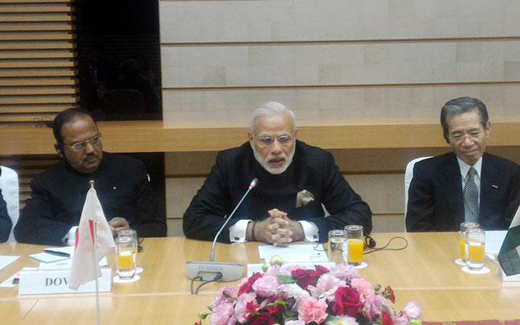Why a civil nuclear deal PM Modi will sign with Japan today is huge for India
Mangalore Today News Network
New Delhi, November 11, 2016: One of the highlights of Prime Minister Narendra Modi’s trip to Tokyo is the landmark civil nuclear deal he is likely to sign with Japan later today. Negotiations for the nuclear deal between the two sides have been going on for a number of years, but the progress was halted because of political resistance in Japan after the 2011 disaster at the Fukushima Nuclear Power Plant.

The two countries had sealed a broad agreement during Shinzo Abe’s visit to India last December, but the final deal was put on hold as certain technical and legal issues were to be thrashed out.
Here’s why a nuclear deal with Japan matters for India:
A deal that will allow Japan to supply nuclear reactors, fuel and technology is ready for signing after six years of negotiations.
India is in advanced negotiations with US-based Westinghouse Electric, owned by Japan’s Toshiba, to build six nuclear reactors in southern India.
India plans to ramp up nuclear capacity more than ten times by 2032.
A deal with Japan is significant because India is not a signatory to the nuclear Non-Proliferation Treaty (NPT), a major condition earlier put by Tokyo.
Japan, the only country to have suffered a nuclear attack, has been seeking assurances from New Delhi that it would not conduct nuclear tests any more.
India has declared a moratorium on such testing since its last nuclear test in Rajasthan’s Pokharan desert in 1998.
India calls the NPT discriminatory and says it is concerned about nuclear-armed China and Pakistan in its neighbourhood.
The nuclear agreement with Japan follows a similar one with the United States in 2008 which gave India access to nuclear technology after decades of isolation.
The India-Japan civil nuclear deal also matters because China’s regional influence in South Asia continues to grow and Donald Trump’s election throws US policies across Asia into doubt.
India, Japan and the US have been building security ties and holding three-way naval exercises, but Trump’s ’America First’ campaign promise has stirred concern about a reduced US engagement in the region.
- Mangaluru: Safety supervisor of NH works alleges assault by traffic cop
- Kasargod acid attack: Woman critical after assault by stalker who later dies by suicide
- Mangaluru: Car fatally knocks down woman at Kuthar
- Special prayers in temples seeking divine blessings for Indian defence forces
- Pope Leo XIV: US Cardinal Robert Prevost elected as the new pope
- Rs 116 crore grant for development of Karkala’s Anekere and Varanga Jain Temples
- Suhas Shetty case: MLAs from DK and Udupi to meet Governor on May 9, seek NIA probe
- Security stepped up across the coast of the state
- DK administration inks MoU with NITK to set up civic think tank consortium
- Police Commissioner warns against provocative, threatening social media posts
- Sullia: 1 dies; 2 injured in collision between cars
- Provocative posts: 2 more FIRs filed in Mangaluru
- Kantara Chapter 1 junior artiste drowns in Sowparnika river
- IPL 2025 suspended indefinitely amid escalation in India-Pakistan tensions
- 7 terrorists, backed by Pak rangers, shot dead trying to infiltrate in Jammu
- Karnataka to hold first-ever survey of persons with disabilities
- X says it blocked 8,000 accounts in India after government’s executive orders
- The S-400 defence system used by India to neutralise Pak missiles
- Firing at LoC hours after India foils Pak attack
- 24 airports shut in India amid escalating India-Pakistan tensions | Full list
- Overnight Naval ops in Arabian Sea after Pak tries to attack India: Sources
- India neutralises Pak drones and missiles aimed at 15 cities, destroys Air Defence system
- Film on Operation Sindoor, 15 bollywood studios rush to register title
- Indian Armed Forces target air defence systems in Pakistan as unprovoked firing along LoC increases
- 100 terrorists killed, Rajnath Singh tells all-party meet on op Sindoor
- Skills and Competencies Take Center Stage at MSN Dialogue Series
- Court remands Maoist Lakshmi to six-day police custody
- Sandhya Shenoy honored with Society for Materials Chemistry Medal-2024
- White Cornus Apartment in Mangaluru
- City girl wins first place in state-level spell bee competition
- Alleged ‘Love Jihad’ Case in Mangaluru: Woman left home voluntarily, says police
- Girl fatally struck by reckless two-wheeler near Belman
- New residential complex for the judges inaugurated in Mangaluru
- Absconding accused nabbed after 8 years
- Truck with cylinders turns turtle in Beltangady
- Bhoota Kola artist dies of cardiac arrest
- Development of the country should be our goal: Ganesh Karnik
- Container truck gets stuck under Modankap railway bridge
- Truck crushes bike’s pillion rider near BC Road
- Head constable dies of heart attack
- CITY INFORMATION
- TRAVEL
- TOURIST INFORMATION
- HEALTH CARE
- MISCELLANEOUS




 Write Comment
Write Comment E-Mail To a Friend
E-Mail To a Friend Facebook
Facebook Twitter
Twitter  Print
Print 


